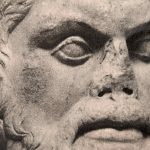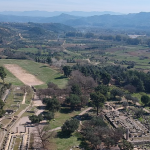In 403 BC, the ancient Greek city-state of Athens, having lost the Peloponnesian war against Sparta and her allies, found herself in a state of civil war. The democracy, under Spartan influence, had voted itself out of existence and given power to 30 Oligarchs (rich aristocrats), who later became known as the 30 Tyrants. As their name suggests, their rule was quickly resented especially by a die-hard group of democrats, who began to machinate towards rebellion. The first civil conflict came at Phyle on the northern borders of the state of Athens, before the democrats, gathering numbers, moved to based themselves in the port area of Piraeus (a long-term hotbed of democratic support). Further battles against the 30 Tyrants, with Spartan reinforcement, took place in the Piraeus, before finally the 30 were removed from office (again with Spartan help after their joint Kings had a change of heart) and the democracy was reinstated. All this happened within a year. The question then was how to move forward. How to remember the conflict and the democratic victory, while at the same time uniting the Athenian community (composed of both democratic and oligarchic supporters) together again, while also not remembering too clearly how fragile democracy had found itself over the past 12 months?
The solution the Athenians came up with was part amnesty / part collective memorialisation / part collective amnesia. Everyone was forgiven for past wrongs – except the 30 Tyrants. Anyone who was an Oligarchic sympathiser was invited to go and live in Eleusis – an area on the western boundary of Athenian territory. Those who had supported the democratic rebels (especially non-Athenians) were given rewards commensurate with the risk they had taken (so those who joined at the very beginning of the rebellion were given full Athenian citizenship, those who had joined at later stages were only given equal tax status). And – perhaps most extraordinary – no one was henceforth to remember past wrongs.
It seems bizarre – in a face to face community of probably little more than 35000 male adult citizens – that such a collective imposition of amnesia could possibly work. On the one hand, however, politicians and legal speech writers soon realised the power of collective amnesia as they sought to re-present Athens’ history and prowess. In 392 BC, less than a decade after the revolution, the ancient legal speech writer Lysias specifically retold the tale of the revolution as simply a story of Athenians against their old external foe the Spartans, consigning the existence of the Athenian 30 Tyrants to the historical memory bin. On the other hand, in 399 BC, Socrates was famously put on trial for amongst other things, worshipping gods the city did not worship and corrupting the young. While these trumped-up charges have often been seen as cover for the city’s general annoyance at his gadfly-esque ongoing critique of the city and its power players, they may also have been a thinly veiled attempt to take vengeance on Socrates for his pro-30 Tyrants associations and friendships. While you could not mention the period of the 30 in the law courts, there was nothing to stop you, it seemed, from leaving it to be read between the lines. Socrates was put to death for his ‘crimes’. And of course, the 30 Tyrants themselves, we hear from the ancient sources, were not in reality left alone either. Many of them ended up dying in all sorts of unnatural ways.
While collective amnesia thus perhaps was not the most long-term successful solution for peace and security, the stronger and more important outcome of this period of civil strife was the empowerment of Athens’ legal system. After 403 BC, Athens moved to republish all its laws in a central public place, overseen hence forth by a board of nomothetai ‘law givers’. They introduced for the first time pay for jury service, and also brought in a completely anonymised and unbribable system of random selection for jury service. They introduced systematic examinations of magistrates after they had completed their term in office. And they moved to build the first permanent law court structures in the city. Henceforth it seems even political disputes were settled more often in the law courts then the political assembly. The infamous system of ostracism, one of the most defining symbols of 5th century BC Athenian democracy (in which a vote was taken in the political assembly to ostracize/exile a citizen who was advocating a particular political action for 10 years in order to allow the city to move forward collectively on an ‘agreed’ course), faded away in the 4th century BC. It was replaced by a legal process in which citizens challenged one another in the law courts for the illegal/improper nature of their political bills and motions. Known as graphe paranomon, this legal tool was incredibly popular: one poor 4th century Athenian, Aristophon of Azenia was tried (and acquitted) of graphe paranomon 75 times!
The proof of the strength of Athens’ democracy post 403 BC is that it lasted right the way through to post Alexander the Great and into the 3rd century BCE, and did so without an empire and massive inpourings of tribute money, which had propped up the 5th century democracy and allowed it to build the Parthenon et al. Partly this strength came no doubt from Athens’ enhanced legal foundations, but also I think it is the case that voting to allow particularly painful and difficult aspects of its past to slip into folds of collective forgetfulness (at least officially) allowed Athens to move on faster than it might otherwise have been able to do.





